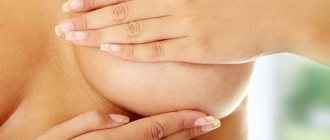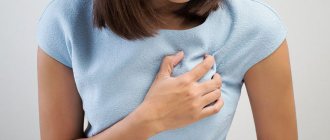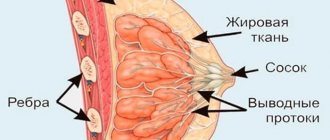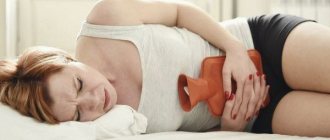Why might your breasts hurt?
This is an absolutely normal physiological reaction to changes in hormonal levels that occur after ovulation.
In the second phase of the cycle, after the follicle matures, the corpus luteum is formed - a source of progesterone. This hormone is responsible for preparing a woman’s body for fertilization and pregnancy, breastfeeding. Progesterone activates the growth of glandular tissue in the mammary glands, increasing blood flow to them, which increases sensitivity and can cause minor pain and an increase in breast size. If pregnancy does not occur, but menstruation does, the level of progesterone drops, the glandular tissues fall into place and the breasts no longer hurt.
This natural process is familiar to almost all women, from puberty to menopause. But there are also lucky women who have never experienced breast pain before their period.
What does this mean?
- Most likely, if your breasts do not cause you discomfort and you usually do not experience other PMS symptoms, this means that your hormonal levels are perfectly balanced and you are absolutely healthy.
- If you are not worried about any other problems related to your reproductive system, why not stop worrying about it?
Possible causes of short-term swelling
Sometimes the breasts swell for a short period of time and then return to normal. Such a short-term increase in size and change in structure may be due to the following factors:
- Sexual arousal. The breast is an area of increased sensitivity and the main erogenous zone of the female body, which reacts sharply to any influence. When sexual desire arises or intensifies, not only the external genital organs become engorged with blood, but also the mammary glands, which are directly involved in the process and are largely responsible for libido. That is why, when excited, the breasts seem to fill up, become more elastic and increase in size. The nipples may darken, harden and acquire a pronounced bulge.
- Breast stimulation. First of all, it is observed during sexual intercourse, but this is far from the only case of exposure. Thus, the mammary glands are stimulated by the child during feeding, and in this case a signal is sent to the brain about the need to produce milk, which fills the ducts and, accordingly, noticeably enlarges the body part. A bra with prominent seams or other convex elements can also stimulate the area. The impact is especially noticeable during active movements that provoke friction of the material against the chest.
- Wearing a tight bra. In this case, the breast tissue is compressed and deformed, which often leads to swelling. And if the underwear does not compress the mammary glands very much, then the pain may well be absent or be insignificant, practically not manifested and imperceptible.
- Overheat. When overheated, blood rushes to the area where the temperature is elevated, fills the vessels and dilates them, resulting in an increase in volume. Such changes in the structure of tissues can be observed when visiting a sauna and steam bath, while staying in hot places, while tanning in a solarium or on the beach, as well as during procedures involving thermal exposure.
- Hypothermia. The body's normal protective reaction to a decrease in temperature is an acceleration of blood circulation. This is why, after exposure to cold, the skin often turns red, and the soft tissues seem to fill and swell. Such changes will also be observed in the chest if it has been exposed to hypothermia. A decrease in temperature may occur during exposure to the cold or after certain procedures such as cryotherapy.
Why don't my chest hurt anymore?
Let’s say your breasts always became engorged and sensitive a few days before your period. But lately, the chest no longer hurts or the level of pain has decreased significantly, and it seems that you just need to be happy about this, but you still want to understand the reason for such changes.
Let's try to understand this situation using the most common examples:
- A situation often occurs when, with the beginning or restoration of a regular and active sexual life, the breasts before menstruation no longer hurt, and other signs of PMS also disappear. This is especially true for young girls or for women who have not had a permanent partner for a long time.
In this case, you hardly need to worry, just enjoy life, your body is thus signaling to you that everything has worked out for it and it is in perfect order.
- Among the most common symptoms of pregnancy are increased sensitivity of the nipples and noticeable soreness of the mammary glands. But quite a few women also noted the exact opposite signs - a complete absence of the usual chest pain in the second half of the cycle in the month when they found out about their pregnancy.
The reason for this is the same changes in hormonal balance, which can manifest themselves completely individually, depending on the characteristics of the body and the initial level of female hormones. So, if you are planning a baby and notice that your period is approaching, and your breasts don’t hurt at all, as usual, then it might be worth buying a pregnancy test.
- The course of the cycle and the symptoms of the approaching menstruation are affected by taking medications: oral contraceptives, hormonal drugs, some medications for diseases not related to the reproductive system, but indirectly affecting the level of hormones in the blood.
If you notice changes in your body's behavior before your period and they bother you, you should consult the doctor who prescribed the medications you are taking.
- Also, the absence of chest pain as part of PMS may be a consequence of recovery from the disease. The cause of pain can be mastopathy, constant severe stress, and even poor functioning of the gastrointestinal tract.
When you get rid of these diseases, their side symptom in the form of chest pain may also disappear. Switching to proper nutrition and a healthy lifestyle can also reduce the symptoms of premenstrual syndrome.
What diseases cause pain before menstruation?
Pathological pain before the onset of menstruation is not always secondary; it can occur immediately after the formation of the cycle. In these cases they talk about congenital health disorders. Finding out the real cause of deterioration in health in adolescents and young girls is not easy, especially if an external examination and general laboratory tests do not indicate the presence of disorders.
Common diseases that may cause primary pain before menstruation:
- insufficient endocrine activity of the ovaries, adrenal glands, pituitary gland;
- connective tissue dysplasia.
In such conditions, pain begins to develop a week or earlier before the expected cycle, severe premenstrual syndrome with many somatic and nervous symptoms is likely:
- dizziness, headaches, migraines;
- blood pressure surges;
- heavy sweating;
- numbness of fingers;
- violation of thermoregulation;
- tachycardia;
- general swelling;
- the appearance of extra pounds;
- indigestion.
Often the bones and the whole body ache, the skin turns pale or red, and nagging pain of moderate or severe intensity appears in the abdomen.
With endometriosis, a typical sign, in addition to painful symptoms, is the specific nature of the discharge: it begins and ends with dark brown clots, indicating the presence of endometrial cells outside the uterine cavity.
It is very dangerous if sudden vomiting or shortly before menstruation appears suddenly. This may indicate progressive fibroids, an ectopic pregnancy, or an incipient miscarriage.
Adhesions in the pelvic area, salpingo-oophoritis, and cysts cause almost all cases of morbidity. Algomenorrhea is often accompanied by disturbances in the menstrual cycle itself—delays in the onset of menstruation from several days to two or more weeks.
Many sexually transmitted infections occur latently, and in advanced cases they affect the uterus and appendages. A few days before the start of menstruation, under the influence of hormonal shifts, the pathogen is activated, causing a number of negative symptoms: severe itching and swelling of the external genitalia, burning, physical discomfort, the presence of strange discharge - abdominal pain can also appear for these reasons.
Is there any cause for concern?
Strictly speaking, both the complete absence of chest pain before menstruation and tolerable, not severe pain are variants of the norm.
- You should only worry if you notice drastic changes in the usual course of your cycle. That is, if your breasts have never been particularly sore before menstruation, then there is no reason to worry.
- If all your life you have felt your period approaching because your chest hurts, then such a course of the second phase of the cycle is the norm for you.
- But when you notice that your cycle is not going as usual, and this phenomenon becomes constant over several months, this indicates changes in hormonal levels.
If you have had an established cycle for a long time, and you are accustomed to noticeable swelling and tenderness of the breasts before menstruation, but at some point such symptoms of the approaching menstruation cease to appear, then you should consider visiting a doctor. The likely cause of this may be hormonal imbalance, in particular a decrease in progesterone levels. This is especially important for those who are planning a pregnancy, since low progesterone levels can become a serious problem in matters of conception, embryo implantation and childbearing. In this case, you should contact a gynecologist, who will most likely direct you to take tests for hormones of the female reproductive panel.
In addition to progesterone, pain in the chest is also influenced by the combination of other hormones and the ratio of their indicators on certain days of the cycle.
An experienced doctor will be able to explain to you in detail why your health has changed and whether something needs to be done about it. If all hormones are within normal limits, it means that your body has independently rebuilt the functioning of the hormonal system to a new level, this also happens.
Diagnostics
To determine why your stomach hurts before your period, you need to undergo a detailed examination. As a rule, it begins with taking an anamnesis. The doctor interviews the patient, finding out during what period the negative signs appeared, as well as:
- pain occurs regularly or occasionally, what is its nature;
- are there any other symptoms;
- whether the patient uses barrier and other types of contraception;
- Are there any problems in your sex life, if so, what are they;
- whether inflammatory or infectious diseases were previously detected, whether there were pregnancies, abortions, childbirth.
For laboratory general and biochemical studies, samples of urine, blood, scrapings from the mucous membrane of the vagina and cervix are required. Bacterial culture, ELISA, or PCR may be required if there is reason to suspect that pain in the lower abdomen is the result of an infectious lesion.
To clarify possible pathologies of internal organs for any type of symptoms, an ultrasound is prescribed. The doctor evaluates the location and shape of the uterus, the condition of the endometrium, ovaries, patency of the fallopian tubes, and identifies signs of inflammation or changes. In difficult cases, diagnostic laparoscopy is performed.
If there is reason to believe that the pain that occurs is a consequence of intestinal diseases and pain, a colonoscopy or MRI is performed.
To determine the pain threshold, the sensitivity of a woman’s nervous system in a skin fold can be tested using an algesimeter.
In some cases, diagnosis can take up to several months.
Pathological causes of changes
You should look for pathology in hormone levels. Since the chest begins to hurt under the influence of progesterone, which in the second phase takes the lead, it may stop due to its deficiency. Women who have not given birth but plan to have children in the future should especially pay attention to this. The alarming situation is accompanied by other signs of menstrual irregularities.
- impossibility of conception;
- pregnancy ends in miscarriage in the early stages;
- the cycle duration is disrupted;
- there are skin rashes;
- painful critical days;
- the nature of the discharge changes;
- and so on.
To study hormone levels, you will have to donate blood on certain days of the cycle. There is no point in trying to regulate it yourself. Treatment must be professional.
If your menstrual cycle functions without disturbances, the manifestations of premenstrual syndrome are reduced, which means you can enjoy the good functioning of your reproductive system!
Irritability before menstruation: how to cope and what to do?
Of course, not everyone is lucky enough to have an understanding spouse who can alleviate nervous conditions and overcome irritability during menstruation, protect them from “female” troubles and avoid tearfulness.
How to help yourself? First of all, you need to learn to live with it, as, for example, people with diabetes live. They adapt, they just have a different way of life.
Those who have a bad mood during PMS need to take into account:
- Every woman and girl knows the time when her mood swings begin, so plan all important matters and decision-making for other days of the cycle. You won’t be able to plan completely, but you will be able to complete some important tasks, avoiding possible conflicts with loved ones and others.
- Admit to yourself (if you haven't already) that your period affects your mood. Tell someone you trust about this. Support won't hurt. A person will always be understanding and, perhaps, will take on some of the worries during “this time.” And you just relax.
- To overcome fatigue and reduce the severity of symptoms of your upcoming period for a long period, sign up for a fitness class. Training is an excellent opportunity to take out aggression on soulless hardware, get a boost of energy and positive emotions, and normalize metabolic processes. Regular exercise promotes the release of “joy” hormones. In tandem with proper nutrition, this will help cope with bad mood before menstruation. In addition, muscle exercise helps get rid of fluid retention in the body.
- Remove “evil” foods from your diet: salt, caffeine, spicy seasonings, pickles and smoked meats. Before your period, eat foods high in phytoestrogens: legumes and soy products, meat, fish, milk, flax seeds, red grapes.
- Make an effort to talk to family members. First, they have the right to know what usually happens to you every month. Secondly, you have the right to their understanding and support.
- There are no pills for a good mood before menstruation. There is dark chocolate containing the “happiness hormone” - serotonin and lemon balm, which relieves irritability.
Why does your mood change before your period?
A bad mood on critical days has long become a reason for ridicule and jokes. The girls themselves joke about it. So what to do? If you can’t overcome irritability, you need to make fun of it, it makes life easier.
Bad mood before and during menstruation is the result of physiological fluctuations in hormonal levels in the blood. Analyze your relationship with a man. When do you most often “sort out” relationships, and when do you have nervous breakdowns (big and small)? I can answer you - after, in good and elated times. You are ready to “move mountains”, work and bring beauty to the world. Just a few days pass and everything changes dramatically. The slightest deviation from life plans causes aggression, and this is not a matter of character, but of hormones. Sharp changes in mood and mood swings are not observed in all girls.
The period when fluctuations in the state begin is different for everyone. A change in life mood can occur a week before critical days, or 2-3 days.
Progesterone stimulates the growth of the endometrium, preparing the uterus for fertilization. There is pain in the lower abdomen, discomfort, and difficulties with bowel movements may occur. Fluid is retained in the body, weight begins to increase, and mood deteriorates. Appetite increases.
In the burst follicle (in which the egg has matured), cells that synthesize progesterone grow.
That's why you're in a bad mood during your period. And menstruation itself is not a pleasant phenomenon. However, the beginning of a new cycle - the first day or two - eases the condition and the mood begins to level out.










